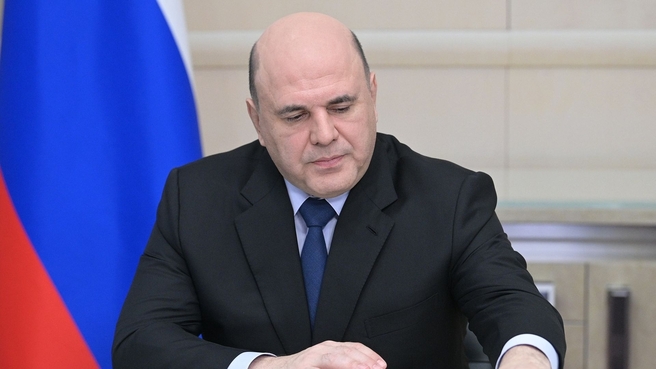Agenda: results of the first meeting of the Eurasian Intergovernmental Council, transition to a single child allowance and new rules for monthly payments from maternity capital, expansion of the industrial products transportation compensation programme, payments to winning municipalities in the nationwide competition of projects to create a comfortable urban environment.
Mikhail Mishustin’s opening remarks:
Good afternoon, colleagues:
At the end of last week, we had a working visit to Kazakhstan. We held the first meeting of the Eurasian Intergovernmental Council in Almaty, within the framework of this year's Russian chairmanship of the EAEU governing bodies. We discussed the most important issues on the integration agenda, taking into account external factors.
We agreed to step up practical cooperation in many priority areas, including food security, which will make the five member states more self-sufficient in terms of basic products. We paid special attention to the formation of common energy markets, as well as to the development of industrial cooperation and the opening of joint high-tech production facilities.
Russia has proposed that the governments of the Union's member states join forces to develop and implement cutting-edge scientific and technological solutions in the leading sectors of the economy. These issues and integration processes in the digital sphere became the central theme of the Almaty Digital Forum in which we took part jointly with our colleagues.
It is important to move towards strengthening technological sovereignty together and on the basis of common principles, using our own technologies.
As the President stressed, achieving true independence and self-sufficiency in this area is one of the strategic priorities of our joint activities.
The Eurasian Economic Union is developing confidently despite the difficulties related to the policies of the collective West. We will continue to streamline our common market. The quality of people’s lives and the future of the five member countries largely depends on this coordinated and effective work.
Here is another important issue. As per the President’s instruction, the Government is creating an integral system for assisting low-income families who are raising children. A bill stipulating a single benefit for these families entered into force on 1 January. The parents of over 2 million children have applied for this benefit in the first 30 days. At the same time, we revised the regulations for using maternity capital.
Earlier, only those raising a second child could spend their maternity capital on monthly payments. However, these people were not eligible for regular state support.
The introduction of the single benefit has solved this problem. From now on, all low-income families can obtain these benefits, regardless of the childbirth sequence. Additionally, they can apply for maternity capital benefits for children under three.
The new regulations are effective starting in 2023, and technical access has been created. The government services website already offers the standard application forms. Moreover, inter-departmental interaction relieves parents of the need to collect a lot of documents.
Ms Golikova, I know that you prioritise this issue. Please continue to monitor this work.
Let’s discuss one more issue. The President has repeatedly noted that Russia will expand interaction with countries that are interested in mutually beneficial cooperation. The Government continues to support domestic businesspersons in their efforts to establish logistic routes. Six months ago, a programme to reimburse companies for shipping industrial goods was launched under the International Cooperation and Exports national project. As practice shows, these measures are popular with enterprises, helping them find new markets and retain supply volumes despite the foreign sanctions pressure.
We therefore decided to raise the maximum subsidies for every organisation in all industrial sectors from 300 million to 500 million roubles. For example, we will reimburse companies for 100 percent, rather than 80, percent of their actual timber shipping expenses. This decision applies to ports in the Northwestern Federal District through 30 June 2023.
I am asking the Ministry of Industry and Trade and the Russian Export Centre to respond quickly to corporate requests.
Mr Belousov, please keep an eye on this.
I would now like to say a few words about support for the regions. Today, we will allocate over 7 billion roubles to 80 municipalities in 48 Russian regions. All of them have won the 7th national competition of projects to create a people-friendly urban environment in small towns and historical communities. Regions that have submitted the best projects will receive between 80 and 400 million roubles. The money will be used to implement comprehensive approaches to reconstructing important municipal landmarks, including parks, embankments, squares and streets.
This annual event is taking place at the initiative of the President. In the past six year, over 600 municipal entities in virtually all Russian regions have won the competition.
In 2022, the President instructed us to double the prize money, to 20 billion roubles. So we decided to add an additional, seventh, competition and expand it by involving towns and cities with a population of up to 200,000.
Since its inception, the regions see this project selection process as an important event and an effective tool for developing territories and changing the image of our communities.












